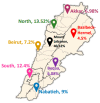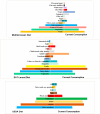Dietary Intake among Lebanese Adults: Findings from the Updated LEBANese natiONal Food Consumption Survey (LEBANON-FCS)
- PMID: 38892719
- PMCID: PMC11174657
- DOI: 10.3390/nu16111784
Dietary Intake among Lebanese Adults: Findings from the Updated LEBANese natiONal Food Consumption Survey (LEBANON-FCS)
Abstract
Background: The rates of obesity, undernutrition, and other non-communicable diseases are on the rise among Lebanese adults. Therefore, it is crucial to evaluate the food consumption habits of this population to understand diet quality, analyze consumption trends, and compare them to healthy diets known to reduce risks of non-communicable diseases.
Aim: To evaluate the food consumption patterns, energy intake, as well as macro- and micro-nutrient intake among a nationally representative sample of Lebanese adults aged 18-64 years old.
Methods: A cross-sectional study was carried out from May to September 2022 involving 444 participants from all eight Lebanese governorates. Sociodemographic and medical information was gathered through a questionnaire, food consumption was evaluated using a validated FFQ and 24 h recall, and anthropometric measurements were recorded.
Results: There was a notable lack of adherence to three healthy diets (Mediterranean, EAT-Lancet, USDA) among Lebanese adults. Their dietary pattern is characterized by high energy, added sugars, sodium, and saturated fat intake while being low in healthy fats, vitamin A, D, and E. Adult women are falling short of meeting their daily calcium, vitamin D, iron, and vitamin B12 requirements, putting them at increased risk of anemia, osteoporosis, and other health issues. Grains and cereals were the most consumed food groups, and most participants were found to be overweight or obese.
Conclusions: In conclusion, the results highlight the need for public health policies and interventions aimed at encouraging Lebanese adults to make healthier food choices and transition towards diets like the Mediterranean, EAT-Lancet, or USDA diet. These diets have been shown to promote overall health and wellbeing.
Keywords: adult; food consumption; food groups; healthy diets; macronutrients; micronutrients.
Conflict of interest statement
The authors declare that the research was conducted in the absence of any commercial or financial relationships that could be construed as a potential conflict of interest.
Figures
Similar articles
-
Decoding diets: insights on ultra-processed food consumption among Lebanese adults from the updated LEBANese natiONal food consumption survey (LEBANON-FCS).Front Nutr. 2024 Dec 5;11:1475223. doi: 10.3389/fnut.2024.1475223. eCollection 2024. Front Nutr. 2024. PMID: 39703332 Free PMC article.
-
Energy, Macronutrients and Micronutrients Intake Among Pregnant Women in Lebanon: Findings from the Updated Lebanese National Food Consumption Survey (LEBANON-FCS).Nutrients. 2024 Nov 26;16(23):4059. doi: 10.3390/nu16234059. Nutrients. 2024. PMID: 39683453 Free PMC article.
-
Food and nutrient intake of school-aged children in Lebanon and their adherence to dietary guidelines and recommendations.BMC Public Health. 2022 May 10;22(1):922. doi: 10.1186/s12889-022-13186-w. BMC Public Health. 2022. PMID: 35534814 Free PMC article.
-
Temporal trends of food consumption patterns in Tuvalu under the context of climate change: COMmunity-based Behavior and Attitude survey in Tuvalu (COMBAT) since 2020.Nutrition. 2024 Sep;125:112488. doi: 10.1016/j.nut.2024.112488. Epub 2024 May 3. Nutrition. 2024. PMID: 38810531 Review.
-
Interventions to accelerate change towards a healthier diet.Proc Nutr Soc. 2018 May;77(2):106-111. doi: 10.1017/S0029665117004086. Proc Nutr Soc. 2018. PMID: 29745360 Review.
Cited by
-
Development and validation of the Lebanese Orthorexia Nervosa Inventory (LONI).J Eat Disord. 2024 Nov 18;12(1):183. doi: 10.1186/s40337-024-01149-y. J Eat Disord. 2024. PMID: 39558393 Free PMC article.
-
Decoding diets: insights on ultra-processed food consumption among Lebanese adults from the updated LEBANese natiONal food consumption survey (LEBANON-FCS).Front Nutr. 2024 Dec 5;11:1475223. doi: 10.3389/fnut.2024.1475223. eCollection 2024. Front Nutr. 2024. PMID: 39703332 Free PMC article.
-
Greenhouse gas emissions (GHGE), water footprint and nitrogen loss associated with food consumption among adults: findings from the updated LEBANese natiONal food consumption survey (LEBANON-FCS).BMC Nutr. 2025 Jan 27;11(1):23. doi: 10.1186/s40795-025-01004-6. BMC Nutr. 2025. PMID: 39871391 Free PMC article.
-
Dementia incidence among a cohort of lebanese older adults: first incidence estimates from the Middle East and North Africa region.Front Dement. 2025 Jan 7;3:1494719. doi: 10.3389/frdem.2024.1494719. eCollection 2024. Front Dement. 2025. PMID: 39840324 Free PMC article.
-
Heavy Metal Contamination in Yogurt from Lebanon: Evaluating Lead (Pb) and Cadmium (Cd) Concentrations Across Multiple Regions.Toxics. 2025 Jun 13;13(6):499. doi: 10.3390/toxics13060499. Toxics. 2025. PMID: 40559972 Free PMC article.
References
-
- Noncommunicable Diseases: Mortality. [(accessed on 24 April 2024)]. Available online: https://www.who.int/data/gho/data/themes/topics/topic-details/GHO/ncd-mo....
-
- FAOSTAT. [(accessed on 24 April 2024)]. Available online: https://www.fao.org/faostat/en/#country/121.
-
- Food Systems Profile—Lebanon. [(accessed on 24 February 2024)]. Available online: https://openknowledge.fao.org/items/c6cb0242-28e1-4ac4-8a51-361bb945a998.
MeSH terms
LinkOut - more resources
Full Text Sources



